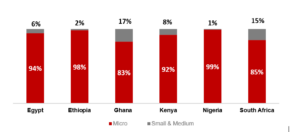The e-commerce landscape in Africa is rapidly evolving, presenting vibrant opportunities intertwined with unique challenges. As the continent’s digital revolution gains momentum, a new wave of entrepreneurs and established businesses alike are exploring the vast potential of online commerce. With a burgeoning population of tech-savvy consumers and increasing internet penetration, Africa stands on the brink of a significant economic transformation. However, navigating this promising terrain is not without its hurdles—from infrastructural limitations and logistical challenges to regulatory complexities and varying market dynamics. In this blog post, we will delve into the rich opportunities that e-commerce offers across Africa, while also addressing the obstacles that must be surmounted for sustainable growth.
The eCommerce landscape in Africa: Current trends and statistics

According to recent statistics, e-commerce in Africa is projected to reach $29 billion by 2024, driven by an increasing internet penetration rate, which reached approximately 43% in 2023. This growing connectivity is transforming the way consumers shop, with mobile devices becoming the primary gateway to online marketplaces.
One of the most striking trends is the rise of mobile commerce, or m-commerce, which has gained immense popularity across the continent, particularly in countries like Kenya and Nigeria. These nations have embraced mobile payment solutions, such as M-Pesa, which enable seamless transactions and foster trust among consumers hesitant to use traditional banking systems. As a result, many e-commerce players are focusing on optimizing their platforms for mobile use, ensuring that their offerings are accessible to the vast majority of users who rely on smartphones for internet access.
Additionally, social media has emerged as a powerful tool for driving e-commerce sales in Africa. Platforms like Facebook and Instagram have become integral to brand building and customer engagement, allowing businesses to connect with their audience in dynamic ways. Influencer marketing is also on the rise, with local influencers helping to bridge the gap between brands and consumers by promoting products authentically.
However, despite these positive trends, significant challenges persist. Logistics and infrastructure remain key hurdles, as many regions struggle with unreliable delivery networks and high shipping costs. Furthermore, regulatory frameworks can vary widely between countries, complicating cross-border trade and creating barriers for businesses seeking to expand their reach.
Opportunities in African e-commerce
As digital connectivity continues to expand across the continent, a growing number of consumers are embracing online shopping, driven by increased smartphone penetration and improved internet access. This shift is particularly pronounced among the young, tech-savvy population, which represents a significant market segment eager to engage with digital platforms.
One of the most notable opportunities lies in the thriving mobile commerce sector. With a large percentage of the population relying on mobile devices for daily transactions, businesses can leverage mobile-friendly platforms to streamline the shopping experience. This opens avenues for innovative payment solutions, such as mobile wallets and pay-as-you-go systems, catering to consumers who may not have access to traditional banking services.
Additionally, the rise of social media as a marketplace cannot be overlooked. Platforms like Facebook, Instagram, and WhatsApp are being utilized not just for social interactions but also for direct sales and marketing. Entrepreneurs can create vibrant online storefronts, engaging with customers through captivating content and targeted advertisements, thereby enhancing brand visibility and driving sales.
Moreover, the demand for locally produced goods is on the rise, with consumers increasingly favoring homegrown products that reflect their culture and values. This trend presents a unique opportunity for local artisans and small manufacturers to showcase their offerings on e-commerce platforms. Tapping into this growing demand, businesses can foster community support and contribute to the local economy while also meeting consumer preferences.
Lastly, the push for digital transformation presents an opportunity for partnerships and collaborations. E-commerce platforms can collaborate with logistics companies to improve last-mile delivery solutions, ensuring that products reach consumers efficiently. Furthermore, businesses can work together to share resources, insights, and technology, creating a more robust e-commerce ecosystem.
Major challenges facing e-Commerce businesses
Navigating the e-commerce landscape in Africa presents a unique set of opportunities, yet it is not without its significant challenges. One of the foremost hurdles is the issue of internet connectivity. While internet access has grown in urban areas, rural regions often struggle with limited or unreliable service, hindering potential customers from engaging with online platforms. This digital divide creates disparities in market access and customer reach, making it essential for e-commerce businesses to develop strategies that cater to diverse connectivity levels.
Another major challenge is the lack of reliable infrastructure. Transportation and logistics can be inconsistent, affecting the timely delivery of goods. Many areas lack adequate roads, and the existing transport options can be unreliable, leading to delays and increased costs. This is particularly critical for businesses relying on fast delivery to meet customer expectations. E-commerce firms must invest in robust logistics solutions or partner with local delivery services to navigate these challenges effectively.
Payment systems also pose a significant barrier. While mobile payment platforms like M-Pesa have revolutionized transactions in certain regions, many potential buyers still prefer cash-on-delivery models due to security concerns regarding online payments. This preference complicates the sales process and can deter e-commerce companies from scaling effectively. To address this, businesses must offer a variety of payment options, including mobile payments, bank transfers, and cash on delivery, to accommodate different customer preferences.
Additionally, regulatory challenges can create obstacles for e-commerce entrepreneurs. The legal landscape across African countries is often complex and varies significantly from one nation to another. Businesses must navigate issues related to taxation, import/export regulations, and consumer protection laws, which can be daunting and may require expert legal guidance.
Lastly, competition is intensifying as more players enter the e-commerce space. New startups are emerging, while established companies are ramping up their online presence, making it crucial for businesses to differentiate themselves through unique value propositions, exceptional customer service, and targeted marketing strategies.
Strategies for success in African e-commerce
Navigating the vibrant landscape of e-commerce in Africa presents a unique set of opportunities and challenges, making strategic planning essential for success. To thrive in this dynamic market, businesses must adopt a multifaceted approach that addresses local nuances while leveraging the continent’s vast potential.
1. Understand the local market: One of the most critical strategies for success in African e-commerce is to gain a deep understanding of the local market. This involves conducting thorough research on consumer behavior, preferences, and purchasing power in specific regions. African markets are diverse; what works in urban areas may not resonate in rural communities. Tailoring your offerings to meet the cultural and economic realities of various demographics can significantly enhance your appeal.
2. Optimize for mobile: With a substantial portion of the African population accessing the internet via mobile devices, it’s crucial to design a mobile-friendly shopping experience. This includes developing responsive websites and applications that load quickly and offer seamless navigation. Furthermore, consider integrating mobile payment solutions, as these are increasingly favored by consumers who may not have access to traditional banking services.
3. Embrace social commerce: Social media platforms are powerful tools for reaching and engaging customers in Africa. Leveraging platforms like Facebook, Instagram, and WhatsApp can enhance brand visibility and facilitate direct sales. Developing targeted social media campaigns that resonate with local audiences can drive traffic to your online store and create a community around your brand.
4. Focus on logistics and Supply Chain Management: Effective logistics and supply chain solutions are vital for overcoming one of the primary challenges in African e-commerce: delivery. Collaborating with local courier services and investing in efficient distribution networks can enhance delivery times and customer satisfaction. Additionally, exploring partnerships with established logistics companies can provide valuable insights into navigating the complexities of transportation across diverse terrains.
5. Build trust with quality customer service: Establishing trust is paramount in e-commerce, especially in markets where online shopping may still be gaining traction. Providing exceptional customer service through responsive communication channels, easy return policies, and transparent transaction processes can cultivate consumer confidence. Building a reputation for reliability can set your business apart in a competitive landscape.
6. Leverage data analytics: Utilizing data analytics can offer valuable insights into consumer trends and preferences, enabling businesses to make informed decisions. Analyzing purchasing patterns, feedback, and market dynamics, e-commerce companies can refine their strategies, personalize marketing efforts, and optimize inventory management.
The future of e-commerce in Africa
The future of e-commerce in Africa shines brightly, fueled by a unique combination of technological advancements, a burgeoning middle class, and a youthful population eager to embrace digital solutions. As internet penetration continues to grow across the continent—now reaching over 50% of the population—more consumers are gaining access to online shopping platforms, creating a vibrant marketplace ripe for innovation and investment.
Furthermore, the rise of mobile technology serves as a game-changer in this evolution. With a significant portion of the African population using smartphones, mobile commerce is rapidly becoming the preferred method for transactions. This trend is supported by the increasing availability of mobile payment systems like M-Pesa and other digital wallets, which provide secure and convenient options for consumers who may not have access to traditional banking services.
However, the landscape is not without its challenges. Issues such as inadequate infrastructure, logistical hurdles, and regulatory complexities can pose significant barriers to growth. Yet, these challenges also present opportunities for entrepreneurs and businesses willing to adapt. Companies that invest in innovative delivery solutions or leverage local partnerships to navigate regulatory frameworks will find themselves well-positioned in an evolving market.
As African governments recognize the importance of e-commerce to economic growth, we can expect to see more supportive policies and initiatives aimed at fostering digital trade. With the continent’s young, tech-savvy population leading the charge, the future of e-commerce in Africa holds the promise of rapid growth, diverse opportunities, and the potential to transform the region’s economic landscape for the better.
Conclusion
Navigating the e-commerce landscape in Africa presents a unique blend of opportunities and challenges that are distinct to the continent. As we’ve explored, the rapid growth of internet access and mobile technology has paved the way for a vibrant online marketplace, enabling entrepreneurs to tap into consumer base eager for goods and services. From the rise of local payment solutions to the increasing adoption of digital logistics and delivery systems, the potential for e-commerce in Africa is immense.
However, this journey is not without its hurdles. Infrastructure deficits, regulatory complexities, and varying technological literacy can pose significant obstacles for businesses attempting to establish an online presence. To truly thrive, entrepreneurs must be equipped with a comprehensive understanding of the local market dynamics and consumer behaviors, as well as the ability to innovate in the face of these challenges.
While the path to e-commerce success in Africa may be fraught with difficulties, it is equally ripe with possibilities. Embracing a strategic approach that includes leveraging local partnerships, investing in technology, and prioritizing customer experience, businesses can not only overcome these challenges but also contribute to the economic growth and development of the region. As Africa continues to evolve into a key player in the global e-commerce arena, those who navigate this landscape with adaptability and foresight will undoubtedly reap the rewards of their efforts.

